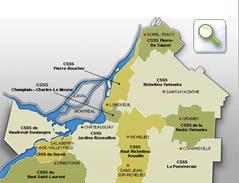
Oups, this website is outdated! But Dialogue McGill has a new website!
Monteregian Language Training Program
Agence de la santé et des services sociaux de la Montérégie
Centre montérégien de réadaptation, Centre de réadaptation en déficience intellectuelle Montérégie-Est, Service de Réadaptation du Sud-Ouest et du Renfort, l’Institut Nazareth et Louis-Braille, Pavillon Foster, Centre le Virage, Centre jeunesse de la Montérégie, Groupe Alerte Santé, Charles-LeMoyne Hospital, CSSS Champlain, CSSS de la Haute-Yamaska, CSSS du Haut-Saint-Laurent, CSSS du Suroît, CSSS Pierre-Boucher, CSSS Haut-Richelieu–Rouville, CSSS Jardins-Roussillon, CSSS La Pommeraie, CSSS Richelieu-Yamaska, CSSS de Vaudreuil-Soulanges.

Professional English-language section: All institutions in the area that offer services to the English-speaking community are enrolled in the project. The services or programs that will benefit from significant improvement in English-language communication skills for their workers are: youth protection, adoption, social emergencies, family-type resources, complaint processing, psychosocial expert testimony, intake and referral in institutions and units, liaison intervention and referral, childhood program for pervasive developmental disorders, age-related loss of autonomy program, centralized access point, front line, home support and maintenance, mental health clinics, emergency, school psychosocial services, health information (info-santé), day centre, outpatient psychiatric clinic and help services for people with visual impairments.
Professional French language section: This measure concerns Pavillon Foster, a rehabilitation centre for English-speaking persons facing drug dependence and pathological gambling problems. This institution has a regional and supraregional vocation. Several staff members only speak English. Since the workers must interact with the resources in the field and the client’s friends and family, knowledge of French is essential.
Priorities are set based on the services identified in the access program, analysis of the data from previous years’ training programs and a survey conducted in 2009-2010 on the assessment of services in English. It emerged that, in general, the greatest need for training was in the psychosocial sector. Therefore, the training project is targeted 40% to the psychosocial sector, 30% to the healthcare sector and 30% to intake.
A lump sum of $130 is given to the institution for each day an employee attends the course. This measure concerns 240 participants. In addition, each learner who participates in at least 80% of the courses will receive $400.
Champlain Regional College – Saint-Lambert Campus